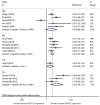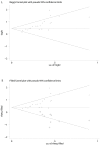Prognostic value of increased KPNA2 expression in some solid tumors: A systematic review and meta-analysis
- PMID: 27974678
- PMCID: PMC5352121
- DOI: 10.18632/oncotarget.13863
Prognostic value of increased KPNA2 expression in some solid tumors: A systematic review and meta-analysis
Abstract
Background: Karyopherin α2 (KPNA2), a member of the Karyopherin α family, has recently been reported to play an important role in tumor progression. However, the association between KPNA2 expression and prognosis in cancer remains controversial. So we performed this meta-analysis to evaluate whether expression of KPNA2 was associated with prognosis in patients with solid tumor.
Methods/findings: 24 published eligible studies, including 6164 cases, were identified and included in this meta-analysis through searching of PubMed, EMBASE and Web of Science. We found that KPNA2 expression was an independent predictor for the prognosis of solid tumor with primary outcome (overall survival [OS]: pooled HR=1.767, 95% CI=1.503-2.077, P<0.001) and secondary outcomes (time to recurrence [TTR], recurrence free survival [RFS] and progression free survival [PFS]). However, the association between KPNA2 overexpression and disease free survival [DFS] in solid tumors was not significant (pooled HR=1.653, 95% CI=0.903-3.029, P=0.104). Furthermore, the subgroup analysis revealed that KPNA2 overexpression was associated with poor OS in East-Asian patients and European patients, as well as patients with gastric and colorectal cancer.
Conclusion: KPNA2 expression may be a useful prognostic biomarker to monitor cancer prognosis. Further prospective studies with larger sample sizes are required to confirm our findings.
Keywords: KPNA2; overall survival; prognosis; tumor.
Conflict of interest statement
The authors have declared that there is no competing interest.
Figures





Similar articles
-
Expression of Karyopherin Alpha 2 and Karyopherin Beta 1 Correlate with Poor Prognosis in Gastric Cancer.Oncology. 2022;100(12):685-695. doi: 10.1159/000526807. Epub 2022 Oct 21. Oncology. 2022. PMID: 36273446 Free PMC article.
-
High expression of KPNA2 defines poor prognosis in patients with upper tract urothelial carcinoma treated with radical nephroureterectomy.BMC Cancer. 2015 May 9;15:380. doi: 10.1186/s12885-015-1369-8. BMC Cancer. 2015. PMID: 25956057 Free PMC article.
-
Karyopherin alpha 2 is a novel prognostic marker and a potential therapeutic target for colon cancer.J Exp Clin Cancer Res. 2015 Dec 1;34:145. doi: 10.1186/s13046-015-0261-3. J Exp Clin Cancer Res. 2015. PMID: 26626145 Free PMC article.
-
High expression of anti-apoptotic protein Bcl-2 is a good prognostic factor in colorectal cancer: Result of a meta-analysis.World J Gastroenterol. 2017 Jul 21;23(27):5018-5033. doi: 10.3748/wjg.v23.i27.5018. World J Gastroenterol. 2017. PMID: 28785155 Free PMC article. Review.
-
High Ki-67 Immunohistochemical Reactivity Correlates With Poor Prognosis in Bladder Carcinoma: A Comprehensive Meta-Analysis with 13,053 Patients Involved.Medicine (Baltimore). 2016 Apr;95(15):e3337. doi: 10.1097/MD.0000000000003337. Medicine (Baltimore). 2016. PMID: 27082587 Free PMC article. Review.
Cited by
-
IRF1 Negatively Regulates Oncogenic KPNA2 Expression Under Growth Stimulation and Hypoxia in Lung Cancer Cells.Onco Targets Ther. 2019 Dec 27;12:11475-11486. doi: 10.2147/OTT.S221832. eCollection 2019. Onco Targets Ther. 2019. PMID: 31920336 Free PMC article.
-
Knockdown of KPNA2 inhibits autophagy in oral squamous cell carcinoma cell lines by blocking p53 nuclear translocation.Oncol Rep. 2018 Jul;40(1):179-194. doi: 10.3892/or.2018.6451. Epub 2018 May 17. Oncol Rep. 2018. PMID: 29781035 Free PMC article.
-
Depletion of nuclear import protein karyopherin alpha 7 (KPNA7) induces mitotic defects and deformation of nuclei in cancer cells.BMC Cancer. 2018 Mar 27;18(1):325. doi: 10.1186/s12885-018-4261-5. BMC Cancer. 2018. PMID: 29580221 Free PMC article.
-
Prognostic role of pretreatment red blood cell distribution width in patients with cancer: A meta-analysis of 49 studies.J Cancer. 2019 Jul 10;10(18):4305-4317. doi: 10.7150/jca.31598. eCollection 2019. J Cancer. 2019. PMID: 31413750 Free PMC article. Review.
-
Silencing of the nucleocytoplasmic shuttling protein karyopherin a2 promotes cell-cycle arrest and apoptosis in glioblastoma multiforme.Oncotarget. 2018 Sep 11;9(71):33471-33481. doi: 10.18632/oncotarget.26033. eCollection 2018 Sep 11. Oncotarget. 2018. PMID: 30323892 Free PMC article.
References
Publication types
MeSH terms
Substances
LinkOut - more resources
Full Text Sources
Other Literature Sources
Medical
Research Materials
Miscellaneous

